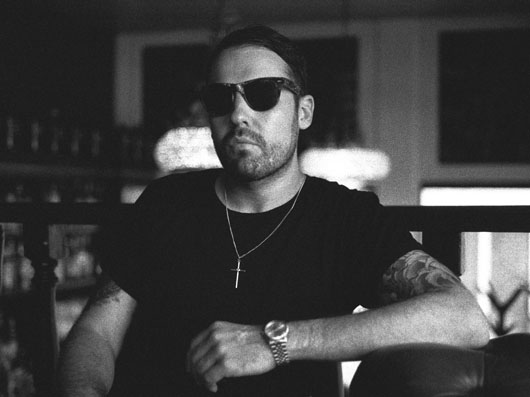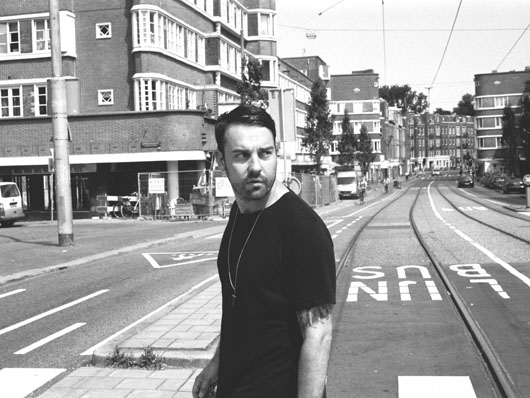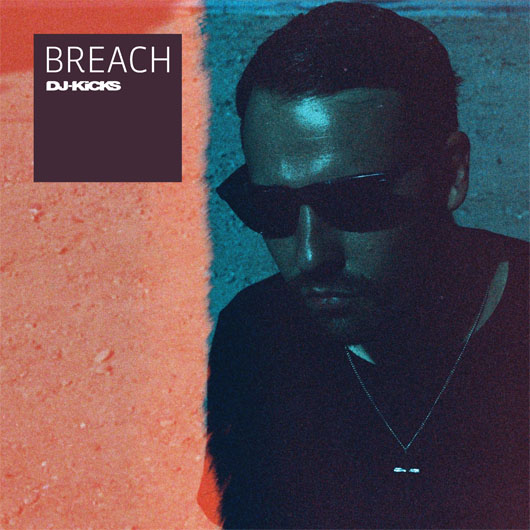Beyond Jack: Breach Is More Than Just One Massive Hit
It’s safe to say that no one could have predicted exactly how huge “Jack”—Breach‘s sharp-edged […]

Beyond Jack: Breach Is More Than Just One Massive Hit
It’s safe to say that no one could have predicted exactly how huge “Jack”—Breach‘s sharp-edged […]

It’s safe to say that no one could have predicted exactly how huge “Jack”—Breach‘s sharp-edged house bouncer and a track originally released on a one-off EP for Claude VonStroke’s Dirtybird label—was going to be, especially not the creator himself, Ben Westbeech. By the end of the summer though, the sleek, sex-charged tune had become one of 2013’s most ubiquitous cuts, finding its way into an increasing amount of DJ crates and festival sets as it was picked up by a major label, given a proper video treatment (the clip currently boasts well over five million views), and broke into the top 10 of the UK singles chart. Even considering its massive success, “Jack” still represents only one small part of Breach’s music, which in turn is only one of the latest chapters in the career of Ben Westbeech, a decade-long veteran of UK dance music with a long list of projects to his name. Now, in the post-“Jack” era, Westbeech appears to be left with the tall task of reconciling his newfound commercial success with the underground credibility he previously spent years accruing, or at least figuring out if he should really be concerned with maintaining either one.
“Everyone has just been saying ‘post-Jack.’ Fucking hell, it’s not the Bible,” Westbeech laughs, perhaps somewhat annoyed, during a Skype call from his current residence in Amsterdam, where he’s been for the past eight months. In truth, he has fair reason to be annoyed with his musical trajectory being divided into such simple, before-and-after terms. A Hertfordshire native, Westbeech has ostensibly pursued music his whole life, receiving a scholarship to attend a music school in England at a young age; while there, he studied classical cello, singing, and piano, and also began to build his DJ chops around the age of 12. Despite this early start, his production career didn’t begin until years later once he’d moved to Bristol, an essential city for UK dance music that Westbeech had fetishized as a teenage connoisseur of drum & bass and early hardcore. “I saw a BBC documentary on drum & bass when I was about 14, so I was heavily into jungle by that point,” he explains. “I just remember seeing [Bristol producer] DJ Die on it, and thinking, ‘Wow, that guy is my hero,’ and then, five or six years later, meeting up and working with him.” Dropping out of university after a year, Westbeech headed towards Bristol with plans to become a drum & bass producer—which he did with some success, most notably under the production handle Lean—but unintentionally found himself working mostly as a vocalist, eventually issuing his debut LP under his given name, a 15-track neo-soul expedition entitled Welcome to the Best Years of Your Life, via Giles Peterson’s Brownswood label in 2007.

Truth be told, prior to 2013, one could have easily made the argument that Westbeech’s work as a vocalist was still his main project. His most recent full-length under any guise was 2011’s There’s More to Life Than This, a pop-flecked, house-rooted album for Strictly Rhythm that showcased his rich, soulful crooning atop an array of tracks favoring soulful and catchy grooves over most anything else. In addition, even in the midst of his current success as Breach this year, the “featuring Ben Westbeech” tag has not been such an uncommon sight, as his vocals have graced a number of high-profile tunes, including Deetron’s “Rhythm” and Tom Trago’s “True Friends.” Still, Westbeech admits that singing has never entirely been where his heart is. “I never wanted to be a singer, I just never wanted to do it,” he explains. “I like it, but my head is set in producing at the moment. It’s fun to be able to do both though, and have some success as a singer. It’s nice to know I still got it in me,” he laughs off before concluding, “Who knows, the next Breach record might be ‘Breach featuring Ben Westbeech,’ you know?”
Between his early years in Bristol and his current residence in Amsterdam, Ben Westbeech spent six formidable years in London, a time he talks about with a glint of nostalgia, which helps explain his plans to return to the city early next year. “I had a studio over in Brick Lane and people would come and see me and it would be like a hub [for producers]. I was right next to Rinse as well, so anyone coming through there could just come to the studio, say hello, have a few beers or whatever, and just roll it out and have fun,” he explains. “It was a good atmosphere to make music in.” While there, Westbeech juggled a number of projects and collaborations, and in 2010, he began his work as Breach with “Fatherless,” a tribal-infused bit of heavyweight UK funky. “I wanted to make a dubstep-house tune with that one,” he tells of the debut Breach release. “I never really got into dubstep, but I’d hear bits that I liked—stuff like the early records on Tempa, and I’d go to FWD, that was wicked—but I was always still making house. For me, I just wanted to try something new and have a bit of fun.” As it turned out, “Fatherless” would become one of 2010’s biggest underground club anthems, a tune which tapped into the then-congealing “UK bass” sound and cemented Westbeech as more than just a talented vocalist and soul-crazed songwriter. But with the build-up to and release of his sophomore album as Ben Westbeech and the additional complications of recording-contract restrictions, the Breach project lay dormant most of 2011 (save for a remix here and there) before being resurrected in early 2012 with “You Won’t Find Love Again”—a sumptuously bass-leaning, R&B-streaked house tune that inaugurated Westbeech’s own Naked Naked label. Dropping all the dubstep-indebted trappings of “Fatherless” in exchange for a heavy-handed take on house, a new era of Breach was born.
By the time we begin to talk about “Jack,” Westbeech is about finished with the “massive spliff” he lit at the beginning of our conversation, and, when the subject comes up, he sounds equal parts dismissive, nonchalant, and proud of the tune’s success. “It’s really surprising, and really, it was overwhelming a bit. It has changed my life,” he tells before half-jokingly adding, “I don’t know if it’s for the better or the worse.” In the months leading up to the tune’s release, Breach already appeared to be well on its way to becoming a high-profile name in UK club music; the project was steadily on the rise with its own brand of sophisticated UK house, one marked by an emphasis on bass weight and a taste for collaborations that found Breach delivering EPs alongside Midland and Dark Sky. Meanwhile, Westbeech and Claude VonStroke met up for dinner in London, an occasion Westbeach used to tell the Dirtybird label head he had a track that would be perfect for the imprint. VonStroke liked the tune, “Let’s Get Hot,” and asked Westbeech to come up with something “even more sexual” to serve as a b-side. Ten days later, a two-minute clip of “Jack” appeared in VonStroke’s inbox, of which he made an extended edit to play out that very night at Manchester’s Warehouse Project. Eventually, Westbeech reworked the tune to somewhat mimic the edit, and “Jack” was real. Becoming the a-side of the single and seeing an original release in March via Dirtybird, the track quickly took off, gaining steam in less mainstream circles before, two months after its release, being picked up by Atlantic for a wider release. “It was so out of the blue, no one could believe it,” Westbeech recalls. “We were just getting these offers that were going up and up and I was just like, ‘Fuck me, what the fuck is happening?’ Every day, I’d wake up and my manager would call me and we’d just be laughing on the phone asking ourselves, ‘What the hell is going on?'”

Like any artist who has existed in the underground before suddenly surging into the charts, Breach has not been immune to “sellout” talk and those claiming he’s traded in his street cred to pander to a wider audience. Although he certainly isn’t above dropping phrases like, “I don’t give a fuck if someone thinks I sold out,” during the course of our conversation, Westbeech really shrugs off his detractors more than curses them. “I made ‘Jack’ as a b-side for an underground release, then everyone just started playing it. It became a sort of ubiquitous record, and then when it got signed [to Atlantic], everyone was like, ‘Oh fucking hell, what a sellout.’ But I’m just sitting here laughing. Just go and have a look at my history and stuff, and know I didn’t make this just to get into the charts.” After a pause, he adds, “People should be happy for you when you find some success, not complaining that you went commercial.” Still, he does acknowledge that “Jack”—and “Let’s Got Hot,” for that matter—are a little bit outside of his usual cannon (though, somewhat ironically, it is Westbeech’s own vocals that have been mangled and processed into the sticky, layered hook on “Jack”). “It’s funny how music works—you can work your whole life towards a certain goal, and then get in through some completely unexpected backdoor, and that’s just the irony of the music business. It’s a strange beast in a lot of ways. And it’s hilarious.”
In the wake of its surprise hit, the Breach project is left to inhabit a somewhat undefined region between the mainstream world that has gobbled up “Jack,” and the underground sphere that has supported him since “Fatherless.” At the moment, Westbeech appears to be operating with one foot in each camp. His new single, “Everything You Never Had,” seems primed to reach out to his new fans, although Westbeech explains that the track was actually well in the works before “Jack” hit. Focusing on a smoky vocal contribution from Andreya Triana, the rolling house tune employs a healthy share of hooks atop its faintly pensive chord progression. At the very least, the single certainly has a fine-tuned machine behind it, having garnered substantial radio play in the UK and a full-on video before officially seeing a release last month.
On the other side of the coin, one will find Breach’s recent contribution to !K7‘s DJ-Kicks series, which dropped just last week. The 15-track mix comes more aligned with the sound Breach has cultivated over the past few years than any place he may be headed in the future, as it balances more classic fare from Inner City, Dopplereffekt, and Winx with the deeper ends of contemporary, UK-leaning house with cuts from Redinho, Detroit Swindle, Pedestrian, and Iron Galaxy, among others. In some ways, Westbeech sees the mix as a timestamp of where his head was then, having moved to Amsterdam “to get a new musical perspective” a few months prior to beginning work on the CD. “A lot of building the mix was going hunting for vinyl in and around Amsterdam and trying to find records that I really cared about,” he explains. “It’s kind of a snippet of your life, and you really have to look at it like that because it’s a physical piece of art, not just another podcast.”

Being commissioned to do the mix shortly after the rise of “Jack,” Westbeech laughs about the fact that his life was a bit hectic around the time he was putting his DJ-Kicks together. “I was so busy at the time and knackered—just fucked from gigs and trying to finish remixes, finish my next single. So when my manager presented it to me as something that was now or never, I was like, ‘Fuck it, it’s time to go,'” he says, upbeat about the whole thing. But maybe that’s just the thing about Ben Westbeech—he seems to have made most of his career decisions with a sort of when-opportunity-knocks approach, and while the results might not be the most consistent, when they hit, they can make a big impact. “I’ve just got a really short attention span, so I have to do a lot of different things at the same time to keep my brain from just standing still,” Westbeech surmises as the root of his ability to juggle so many projects at once.
With what has been the most profoundly game-changing year of his career almost in the rearview, it’s worth noting that Westbeech seems nowhere near slowing down. For Breach, the near future holds a slew of new material, including an EP for Will Saul’s Aus imprint, and planned collaborations with Tiga and another underground-turned-chart-rising UK producer who we’re told it is better not to name quite yet. Westbeech’s Naked Naked label also plans to kick into gear early next year with an EP from Lorca, which Westbeech says lays out where the imprint will be heading next year; he describes its sound as “a little deeper and less banging.” Furthermore, Westbeech talks about eventually wanting to work as a producer on a full album for a band, citing Andrew Weatherall’s role behind the boards on Primal Scream’s 1991 LP Screamadelica as a benchmark in his musical upbringing. In the end, Westbeech proves to be neither a producer in search of crossover hits or an unflinching underground maven, but rather, a bit of everything—vocalist, producer, remixer, label head; moving into the future, it’ll be interesting to see which doors he opens, particularly as the opportunities continue to come knocking in this post-“Jack” era.

